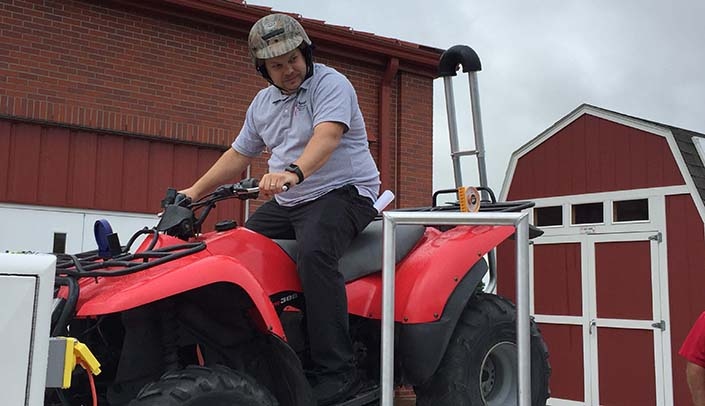UNMC is one of several organizations collaborating to present free training for the public on the safe use of all-terrain vehicles (ATVs).
Points to remember
- Ride on an appropriate-sized ATV;
- Wear a helmet;
- No passengers; and
- Never drive on a paved road or gravel.
Rural hospitals in Nebraska are seeing an increase in severe injuries from ATVs. According to the Nebraska Department of Health and Human Services, in 2016, ATV incidents resulted in seven deaths, 94 hospitalizations and 578 emergency department visits in Nebraska.
This year, the Central States Center for Agricultural Safety and Health at UNMC, the University of Nebraska Extension and the Nebraska Safety Center at the University of Nebraska at Kearney will present training sessions to adults and children in more than 50 cities across Nebraska. The training, which was developed in response to accidents on and off the farm, includes safety practices, such as proper personal protective equipment, and a demonstration with an ATV simulator on the proper way to ride.
The most common cause of agricultural-related deaths in Nebraska is ATVs and overturned tractors, said Susan Harris-Broomfield, University of Nebraska Extension educator in Kearney and Franklin counties. Course presenters include Harris-Broomfield and Aaron Yoder, Ph.D., and Ellen Duysen, both with the UNMC College of Public Health and the Central States Center for Agricultural Safety and Health at UNMC.
Duysen said everyone in rural Nebraska probably knows someone who’s had an ATV incident. Duysen said ATVs have gotten larger and more powerful.
“When ATVs tip, people get thrown off and run over,” she said. “The first parts of the body likely to be impacted are the head and neck. Those who survive roll-over incidents may be paralyzed for life. Emergency room personnel are concerned about the senseless injuries and deaths.
“It’s a tragic public health issue,” Duysen said. “We train parents and others about why kids shouldn’t be on these powerful machines. We could significantly reduce death and injury from ATVs in Nebraska if we can keep children and those who haven’t had training off ATVs but that’s not going to happen so we need to focus on training and education about the risks.”
Duysen said Harris-Broomfield is the driving force behind ATV safety in Nebraska.
Harris-Broomfield said ATVs have been used on farms for years as an efficient mode of transportation.
“It’s a means to get the job done,” Harris-Broomfield said. “But it’s frustrating to hear about the preventable injuries and deaths that happen. Few people have had training on appropriate use or laws. The accident and injury rates for children between 10 and 15 years old are pretty high.”
She said those under age 16 should not be driving or even riding on full-sized ATVs.
“Ninety-seven percent of ATV-related injuries to those under 16 years old happen when operating full-sized machines. It’s a matter of not letting kids get on them,” Harris-Broomfield said.

the only safe way to ride an ATV is one that is stationary. An inherently dangerous vehicle especially for children